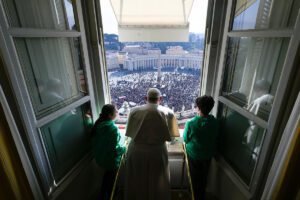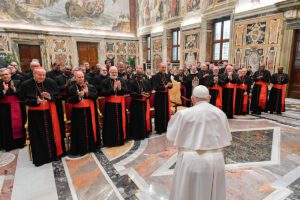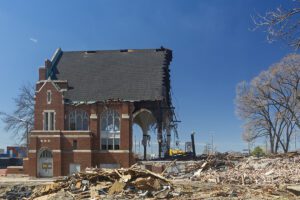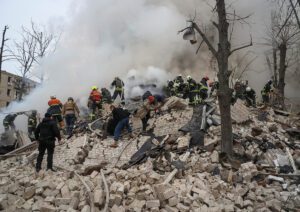VATICAN CITY (CNS) – Today’s wars and conflicts have put humanity on the brink of the abyss, Pope Francis said, calling for a worldwide cease-fire.
“I will never tire of reiterating my call, addressed in particular to those who have political responsibility: stop the bombs and missiles now, end hostile stances” everywhere, the pope said in an interview with La Stampa, an Italian newspaper, published Jan. 29.
“A global cease-fire is urgent: either we do not realize it or we are pretending not to see that we are on the brink of the abyss,” he said.

Asked specifically about the situation in Israel and Palestine, the pope said that the Oslo Accord is “very clear with the two-state solution. Until that agreement is implemented, real peace remains distant.”
The pope said the thing he fears most is a “military escalation” in which the conflict might “further worsen the tensions and violence that already mark the planet.”
However, he said he is also hopeful because “confidential meetings are taking place to try to reach an agreement. A truce would already be a good result.”
A key figure in the Vatican’s efforts concerning the Middle East, he said, is Cardinal Pierbattista Pizzaballa, the Latin patriarch of Jerusalem. “He is trying with determination to mediate.”
“The Christians and the people of Gaza — I don’t mean Hamas — have a right to peace,” the pope said.
He said he connects daily on the video platform Zoom with the Holy Family Catholic Parish in Gaza to speak to them. Some 600 people sheltering in the parish compound are “living their lives looking death in the face every day.”
The other priority remains the release of the Israeli hostages, he added.
The Holy See continues with its diplomatic efforts regarding Ukraine, particularly through the papal envoy, Italian Cardinal Matteo Zuppi, who is working to “build an atmosphere of reconciliation,” the pope said.
It is also still mediating for the exchange of prisoners, the return of Ukrainian civilians and repatriation of Ukrainian children forcibly taken to Russia. One child has already returned to its family, he said.
Asked if there were such a thing as “just war,” the pope said it is better to use the term “legitimate defense.”
“If thieves come into your house to rob you and attack you, you defend yourself. But I don’t like to call this reaction a ‘just war’ reaction, because it is a definition that can be exploited,” he said.
“It is right and legitimate to defend yourself,” he said, so it is better to discuss situations of legitimate defense, “so we can avoid justifying wars, which are always wrong.”
World peace must be built on dialogue and the pursuit of human solidarity and fraternity, he said. “We can no longer kill each other, between brothers and sisters! It makes no sense!”
The pope also called for peace after praying the Angelus with visitors in St. Peter’s Square Jan. 28.
He highlighted the current conflict in Myanmar, joining the call of some Burmese bishops for turning weapons of destruction “into instruments for the growth of humanity and justice” and for allowing humanitarian aid to reach everyone in need.
“Peace is a journey, and I invite all parties involved to take steps in dialogue and to clothe themselves in understanding so that the land of Myanmar may reach the goal of fraternal reconciliation,” the pope said.
“The same must happen in the Middle East, in Palestine and Israel, and wherever there is conflict: the populations must be respected!” he said.
Thinking of all victims of war, especially civilians, the pope said, “Please, listen to their cry for peace: it is the cry of the people, who are tired of violence and want the war to stop. It is a disaster for the people and a defeat for humanity!”
The pope also thanked the boys and girls of Catholic Action, parishes and Catholic schools in Rome who came to Rome for the annual “Caravan of Peace,” organized by Catholic Action.
“Thank you for your presence! And thank you for your commitment to building a better society,” he said.



